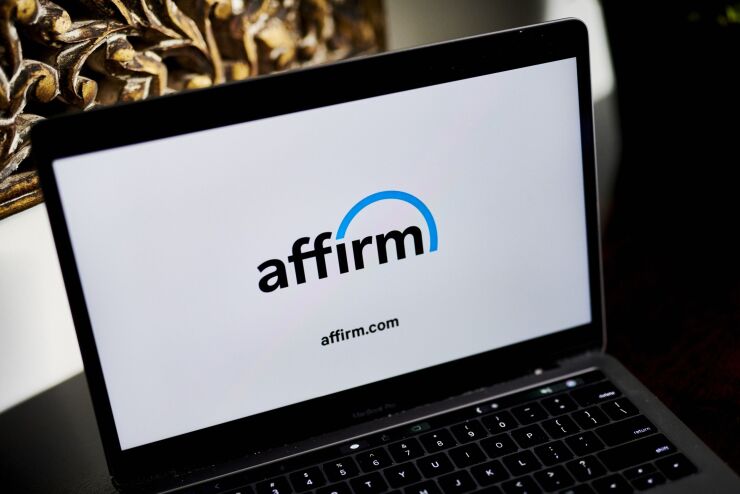
Despite rising interest rates and ongoing economic pressure on its access to capital, Affirm reported better-than-expected results during the quarter that ended March 31 and reiterated its goal to turn its operating income positive before the end of this year.
Affirm saw ongoing volume growth during its fiscal third quarter, while its delinquent-account rate moderated after spiking last fall, and the company improved its mix of interest-bearing loans.
Affirm is now working to shift more of its volume to loans offered at interest rates up to 36%, and simultaneously experimenting with offering "merchant-subsidized" lower-interest loans under 10%, the company said. As part of that shift, Affirm has formed a partnership with FICO, with which it's devising a "first-of-its-kind" approach for reporting its consumer loan activity to credit reporting agencies to be factored into industry credit-lending decisions.
The Consumer Financial Protection Bureau last year flagged the lack of a standardized approach for
"We intend to step into the leadership role and help the industry report buy now/pay later loans and make sense of them in the broader context of borrowing," said Max Levchin, founder and CEO of the San Francisco-based buy now/pay later fintech, during a Tuesday conference call to discuss earnings.
In recent months Affirm has shifted its mix of loans away from interest-free installment loans to more loans with longer terms that charge interest. At the end of the first quarter about 70% of Affirm's loans were interest-bearing, with the remainder based on interest-free Pay-in-Four loans or 0% APR loans with merchants.
"We compounded many small wins into big gains," Levchin said.
Levchin is pinning his hopes for Affirm's growth this year on the rollout of Debit+, the company's card that enables consumers to pay online or in person and provides the option to choose between paying in full or apply to pay over time. The move supports Affirm's use within physical stores, where it's competing head-to-head with BNPL rival Klarna, which has its own physical debit card.
In the recent quarter, early users of Debit+ conducted seven times more transactions than the typical Affirm customer. Sales through physical stores account for less than 5% of Affirm's total volume, Affirm said.
"Frequency is the path to the top of the consumer wallet," Levchin said in a shareholder letter also released Tuesday.
Total active merchants using Affirm grew 19% to 246,000 during the recent quarter over the same period a year earlier. The expiration early this year of Affirm's exclusivity with Amazon so far hasn't dented the company's momentum; Affirm saw "really strong" gross merchandise volume growth with Amazon and also with Shopify during the quarter, Michael Linford, Affirm's chief financial officer, said during the call.
The tightening economy and shrinking capital continue to be pain points for Affirm, although the company said it ended March with $11.4 billion in funding capacity, up 9% from $10.5 billion at the end of 2022. Affirm said it tapped 71% of its total funding during the quarter.
Affirm added $400 million more in funding through expansion of an existing offering, increasing its total funding capacity to $25 billion in annual gross merchandise volume, the company said last month. Affirm plans to add at least one new bank partner to help originate loans by the end of 2022 to diversify funding sources and reduce risk, the company said.
During the recent quarter, Affirm's gross merchandise volume rose 18%, to $4.6 billion. Revenue rose 7%, to $381 million from the same period a year earlier, but was down about 5% from the most recent quarter, which ended Dec. 31, 2022.
The company reported an operating loss of $310 million, a 26% steeper loss than the same quarter a year earlier, due to expenditures in technology and data analytics; plus a $35 million charge for a restructuring announced two months ago, in which Affirm laid off 19% of its staff and shuttered its cryptocurrency operations.
Delinquencies on loans at least 30 days past due rose 20 basis points, to 2.3%, over the same period a year earlier, but continued their month-over-month march downward from a peak of 2.7% at the end of September 2022.
Overall, analysts said Affirm's recent results exceeded expectations on many fronts, though concerns about higher funding costs for the company persist.
"Higher [interest] rates and wider credit spreads are expected to continue to be a headwind, resulting in higher funding costs and lower gain on sale of loan revenue, although we could see some offset from pricing initiatives, including higher APRs, over time," said Wedbush Securities in a Wednesday note to investors.






